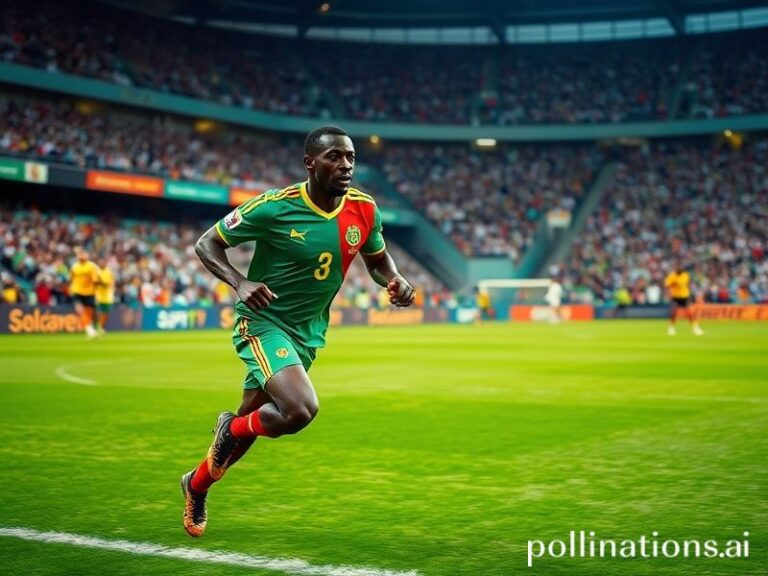How ‘Gronk’ Went Global, Sparked Trade Wars, and Became the Esperanto of Existential Dread
PARIS—Somewhere between a Tokyo boardroom where executives now greet each other with “gronk-prime” and a Lagos cyber-café where the word is tattooed in Comic Sans on a bouncer’s neck, humanity has apparently decided that “gronk” is the new Esperanto. It isn’t listed in any dictionary older than last Thursday, yet it has already triggered trade disputes, a minor diplomatic incident in Reykjavík, and an NFT collection that sold out faster than you can say “soft-power linguistic imperialism.”
The term began, as most global nuisances do, in the United States—specifically inside a dimly lit Boston sports bar where Rob Gronkowski spiked not only a football but also the English language itself. A single syllable, half grunt, half honk, ricocheted off ESPN highlight reels, slipped past customs officials who were busy confiscating Kinder Eggs, and landed in the inboxes of brand strategists from São Paulo to Seoul. By the time the first European marketing intern tried to conjugate it—“I gronk, you gronked, we have all been severely gronked”—the infection was complete.
International corporations, always eager to monetize the ineffable, moved with the speed of a credit-rating downgrade. Adidas launched “Gronk-X” cleats, a shoe allegedly so aerodynamic it can outrun your student-loan interest. Meanwhile, a Shanghai startup unveiled the “GronkCoin,” a cryptocurrency whose white paper is 38 pages of emojis and whose market cap fluctuates with Gronkowski’s Instagram thirst traps. The People’s Bank of China issued a terse statement reminding citizens that speculation in athlete-themed tokens “does not align with socialist core values,” which is Mandarin for “good luck with that.”
The geopolitical fallout has been predictably absurd. When the Icelandic ambassador to the UN opened his General Assembly speech with “Greetings, fellow gronks,” the delegation from Liechtenstein walked out, later claiming cultural appropriation of whatever it is Liechtenstein does. Russia filed an official protest insisting that “gronk” sounds suspiciously like the Siberian verb for “to overthrow,” prompting the U.S. State Department to issue travel advisories warning Americans abroad to avoid “excessive gronking gestures.” Analysts note this is the first bilateral crisis sparked by an onomatopoeia since the Great Kerfuffle of ’72.
Naturally, the digital realm has turned the word into an ideological battleground. On Reddit, r/gronksignal users debate whether “to gronk” implies violence or affection—consensus: both, depending on blood-alcohol level. TikTok’s algorithm, that tireless matchmaker of attention and doom, now pairs #GRONK with videos of capybaras eating popsicles, thereby ensuring that Brazilian teens believe the term is Portuguese for “existential chill.” Elon Musk tweeted simply “Gronk = Mars,” which caused SpaceX stock to wobble like a SpaceX rocket attempting to land in high winds. Somewhere, a linguistics PhD is updating her dissertation title to “Toward a Typology of Post-Verbal Gronkatives: A Pan-Global Study in Late-Stage Capitalist Semantics.”
Yet beneath the memes and merchandise lies a darker truth: “gronk” is the perfect mirror for an era when meaning itself feels concussed. The word has no fixed definition, no grammatical tether, and therefore infinite shelf life—an ontological black hole into which we pour our anxieties about economic precarity, climate dread, and the creeping suspicion that our phones are laughing at us. It is the linguistic equivalent of a speculative bubble, only funnier because nobody’s been evicted from their apartment by a syllable. Yet.
And so, as COP28 delegates in Dubai draft clauses on carbon offsets, a delegate from Ghana proposes a “gronk credit”—an intangible unit of cultural cool that richer nations can purchase to offset their cringe. The motion is seconded by Sweden, tabled by Saudi Arabia, and meme-ified into oblivion before lunch. The planet keeps warming, the markets keep gronking, and somewhere in a Dublin pub an old man raises a pint and mutters, “At least the Black Death had the decency to kill you.” He does not realize he has just coined the post-post-ironic slogan for 2024.
In the end, we are all temporary tenants of language. “Gronk” will eventually collapse under the weight of its own overuse, retiring to the museum of dated slang beside “groovy” and “YOLO.” But its brief, gaudy reign reminds us that when civilization feels like a live-tweeted nervous breakdown, even gibberish can pass for prophecy. Until the next syllable spikes the lexicon, keep your head down, your VPN on, and remember: if someone offers to pay you in GronkCoin, the polite international response is a soft, dignified scream.







